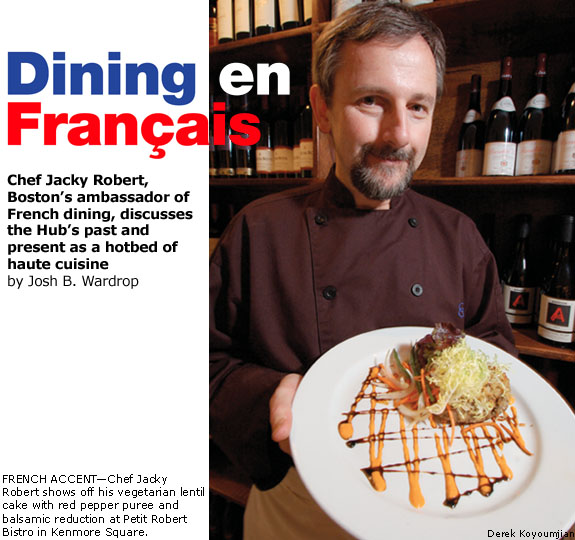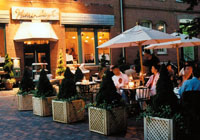
Any discussion of French culture must inevitably turn to food. France is a nation that takes its cuisine very seriously—from the meticulous and delicate techniques involved in its preparation to the rare, often exotic, ingredients used to make signature dishes.
|
Chef Jacky Robert, one of only 200 Maitres Cuisinier de France in the world, has likely forgotten more of his French cuisine training than most chefs will ever know. Following the advice of his father, Robert first arrived in Boston from France in 1972, aspiring to make his name as a chef, and found himself at the vanguard of a movement that turned Boston diners onto Gallic grub during a stint at his uncle Lucien’s legendary establishment, Maison Robert.
Since then, he’s owned restaurants in California, returned to Maison Robert in the late 1990s, spent 2001–2003 as executive chef at another landmark Boston eatery, Locke-Ober, and last year opened his newest venture, the upscale yet casual Petit Robert Bistro (Kenmore Square, 468 Commonwealth Ave., 617-375-0699) which has drawn praise for its more relaxed take on classic haute cuisine. Recently, he spoke with Panorama about how French dining in Boston has evolved over three decades.
PANORAMA: When you first came to work in Boston, the
city was still heavily into eating beans and cod. What was the
climate like for French cuisine at that time?
JACKY ROBERT: Pretty much the
big competition then was the Ritz-Carlton and Locke-Ober. There
were a few French chefs (in town), but soon it seemed like any
restaurant that wanted to get on the map needed a French chef to
do so.
P:
How does that compare to the scene today?
JR: I don’t know how many
actual French chefs are in Boston anymore. [For two decades]
cooking schools have been creating a new breed of “American
French” chefs. So, today, Boston has people like Lydia Shire,
Gordon Hamersley, Ken Oringer—Americans who have been to France
and have studied French cuisine.
P:
What effect has this “Americanization” of French cooking had on
the cuisine itself?
JR: I think French cuisine is
alive and well thanks to these Americans who have changed it.
Where French chefs remain quite conservative, American chefs are
very creative. They put no restrictions on themselves, and feel
comfortable mixing in Latin American and Asian elements. And
they’re very well-regarded internationally for that creativity.
P:
What are the biggest misconceptions that diners have about French
cuisine?
JR: There’s several. There’s
the myth that French cuisine has to be expensive…that it has to
be made with “heavy” sauces, and that every establishment has a
dress code. There’s also a fear by diners that all French
restaurants write their menus all in French—people seem worried
they won’t understand what they’re eating.
P:
Did those misconceptions inspire the concept of Petit Robert
Bistro?
JR: Absolutely. We wanted to
open the most affordable, casual French restaurant in Boston.
There’s a $20 line that we don’t want to go above for any dish.
We write everything in English, so the place is accessible to
everyone. That’s given us a blend of customers, from college
students in shorts to business people in suits.
P:
Where do you see the future of French cuisine going?
JR: Fine dining restaurants
will always be there, but today less people can afford them. So,
I think the trend will be to do fine dining without the
expense…and to hopefully open the doors of French restaurants to
a younger generation of diners.

back to homepage


